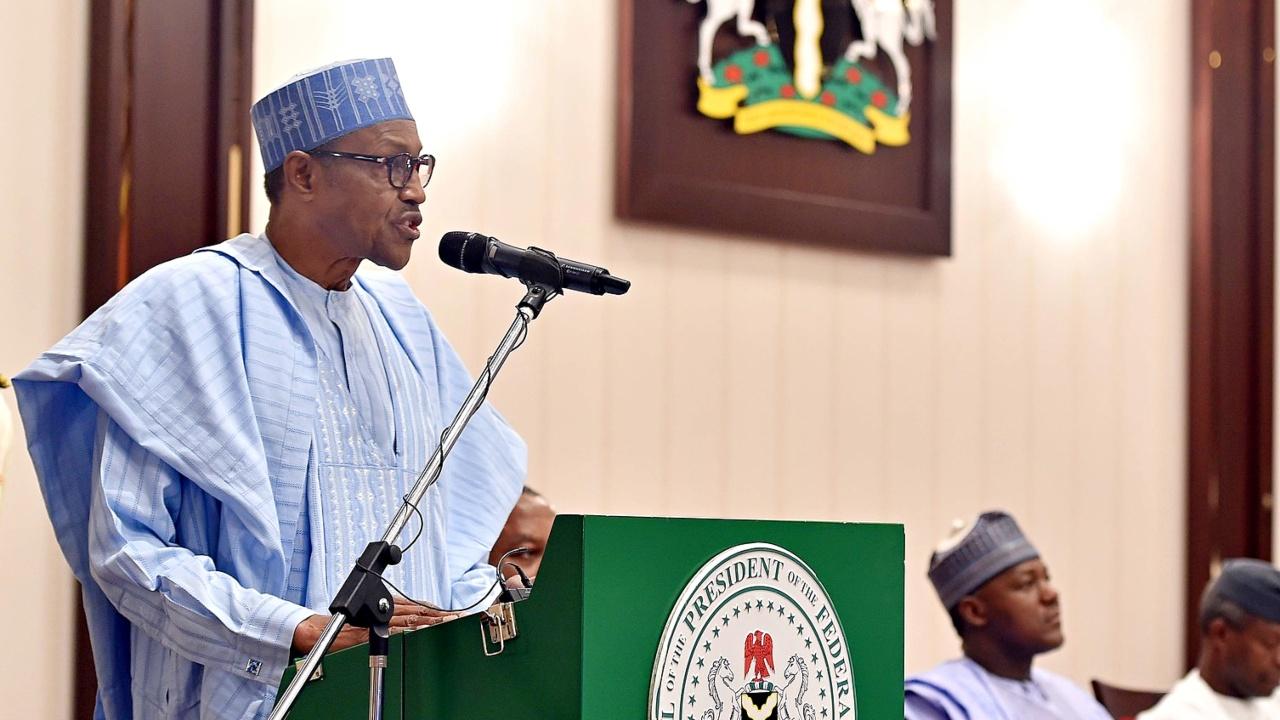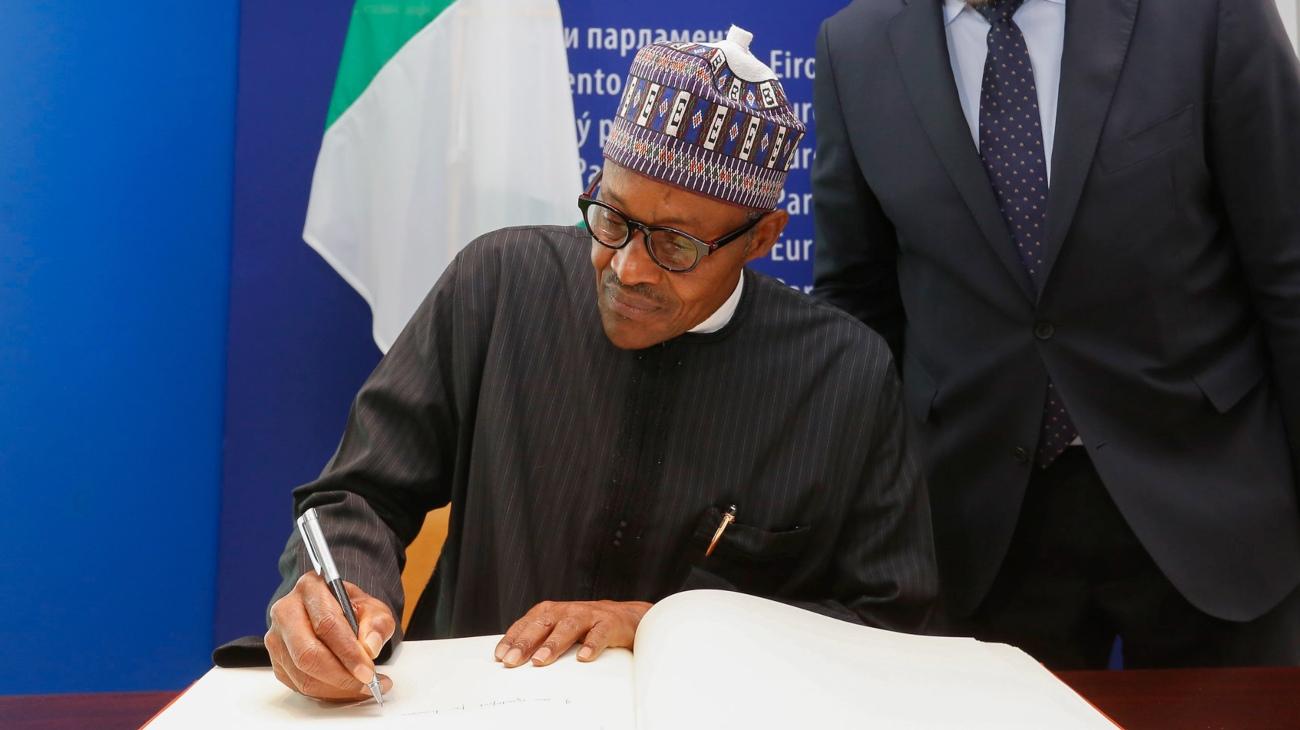In 2015, Muhammadu Buhari emerged as the Presidential candidate of the newly formed opposition coalition, the All Progressives Congress (APC), and many ordinary Nigerians heaved a sigh of relief. Buhari was said to be a no-nonsense retired general who did not condone corruption. Yet, as Uche Igwe writes, Buhari’s government is characterised by a virulent form of nepotism and the government machinery is captured and controlled by a few individuals whose agenda is to favour sectional interests and alienate others.
The idea of Muhammadu Buhari coming back was generally perceived as a much-needed opportunity to get the country back on track. As a military head of state many years ago, he led a widespread campaign known as War Against Indiscipline (WAI) which mandated citizens to comply with law and order across the country. Predictably, his campaign was anchored on three issues: corruption, security and rebuilding the economy. In his famous inaugural speech in 2015, Buhari promised neutrality in office as he told a crowd of enthusiastic citizens that “he belonged to everybody and belonged to nobody.”
Nigerian corruption seems to have worsened under his watch
According to many observers, the Nigerian corruption problem has grown from bad to worse, seven years into his reign. His tenure has turned out to be full of rhetoric devoid of action. In practice, his government is characterised by a virulent form of nepotism and the government machinery is captured and controlled by a few individuals whose agenda is to favour sectional interests and alienate others. The verdict is that although the President himself may not be corrupt, he deliberately allowed members of his family and close friends to accumulate public resources.
Weaponisation of anticorruption worsened public perception
As soon as Buhari resumed office, a few individuals who served under the former administration of President Goodluck Jonathan were arrested and sent into detention, including the former National Security Adviser Sambo Dasuki, former Principal Private Secretary Hassan Tukur, former Minister of State for Finance Bashir Yuguda and other aides. Many observers saw these actions as the weaponisation of anticorruption for political objectives. There seemed to be very little coordination with the anticorruption agencies despite launching the National Anticorruption Strategy in 2017. These intrigues led to the arrest and subsequent removal of the former head of the Economic and Financial Crimes Commission (EFCC). Findings from the panel that probed him have not been made public. Relatedly, President Buhari’s ally and former Secretary to Government was caught in a scandal but never diligently prosecuted.
Preventive approaches yielded results that did not appear enough
Although inter-agency friction among anticorruption institutions did not disappear, the National Anti-corruption strategy (NACS) introduced some improvements. Coordination mechanisms like the Inter-Agency Task Team (IATT) became more effective. Agencies like the Independent Corrupt Practices and other Related Offences Commission (ICPC) has gone ahead to align their strategic plan with the strategy. The combined efforts of civil society and government culminated in tracking the expenditure of Constituency Development Funds (CDF) allocated to parliamentarians across the country. Although some progress has been recorded in this regard, the perception of the parliament as a rubber stamp institution rather than an effectively independent arm of government has been a stumbling block to the effectiveness of these efforts. Thus far, some recoveries have been made through efforts channelled at preventive approaches rather than the usual traditional prosecution of offenders. A few highly placed military officers were also apprehended in what looks like a systemic scourge in the security sector.
The absence of political will continues to hamper policy implementation
Furthermore, other policies have been introduced during the administration. However, many of them were either disorganised or muddled up due to the absence of political will from the top. For instance, the Whistleblower Policy in 2016 was meant to enable the government to recover stolen or concealed assets through information voluntarily provided by whistleblowers. Official sources indicate that as of 2020, between 594.09 and 700 billion naira might have been recovered through the implementation of the policy. Yet this did not stop the harassment of whistleblowers within the same government a few months after introducing the policy. Therefore, there is a need for enabling legislation to protect whistleblowers.
Tales of diversion, bloated consultancy contracts and misappropriation of recovered assets abound
Several allegations have hindered the ongoing fight against corruption. One of the most embarrassing ones is that the Attorney General and Minister of Justice allegedly used his office to dispose of recovered assets worth 4 trillion naira ($9 billion) in a manner shrouded in opaqueness. The Nigerian Governors Forum (NGF) once accused him of fraud and working against the public interest for insisting on paying $418 million to private consultants as a percentage of Paris Club refunds from funds belonging to the states. On October 24, 2019, the Attorney General signed a new regulation on asset tracking and management which empowers his office to take charge of the custody, management and disposal of all assets finally forfeited to the Federal Government. He later inaugurated a committee for the disposal of such forfeited assets. The courts annulled the committee while the regulation was declared invalid.
With a few months to the end of his tenure, Nigerians have come to the sad conclusion that their President has got nothing to offer the country anymore, and everyone is now starting to look beyond him. President Buhari continues to dwell in his own delusional bubble of performance, believing that he may still leave a legacy of fighting corruption. However, scholars like Jibrin Ibrahim insist that the President’s footprint will be that of a leader who ran the most corrupt regime in the history of Nigeria. Civil society organisations like the Socio-Economic Rights and Accountability Project (SERAP) believe that the country’s corruption scale has remained massive, systematic and utterly overwhelming. Other commentators insist that the regression in the country’s scores on Transparency International’s Corruption Perception Index (CPI) indicates that Buhari might have lost the anticorruption war.
Similarly, others see what is left of it as hopeless. The common verdict, therefore, is that Nigeria’s President is an inept leader who has utterly failed to tackle corruption. For now, it is a waiting game for everyone to see him go.
The views expressed in this post are those of the author and in no way reflect those of the Africa at LSE blog or the London School of Economics and Political Science.
Photo: General Muhammadu Buhari. Credit: Chatham House. Licensed under the Creative Commons Attribution 2.0 Generic





